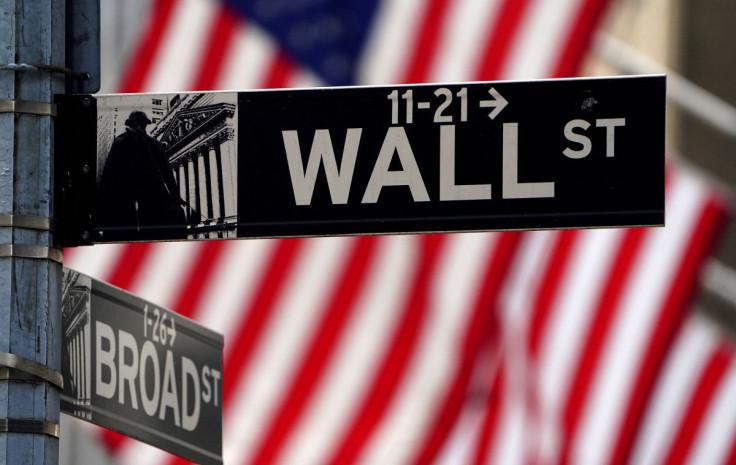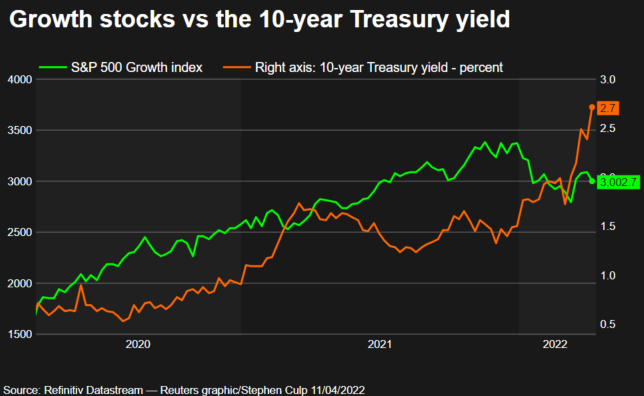Wall Street Stumbles As Surging Treasury Yields Slam Growth Stocks

Wall Street closed sharply lower on Monday as investors started the holiday-shortened week in a risk-off mood, as rising bond yields weighed on market-leading growth stocks ahead of crucial inflation data.
All three major U.S. stock indexes ended deep in negative territory, with tech and tech-adjacent stocks pulling the Nasdaq down 2.2%.
"There's been two kinds of sell-offs in the past month or two," said Peter Tuz, president of Chase Investment Counsel in Charlottesville, Virginia. "There's the rising yields which primarily affects tech and other growth stocks, and then there's the recession/economic slowdown sell-off that affects energy and various materials' names.
"Today you're seeing both."
GRAPHIC - Growth stocks vs the 10-year Treasury yield

The benchmark 10-year U.S. Treasury yield hovered near a three-year high ahead of key inflation data expected on Tuesday. [US/]
The U.S. Federal Reserve has vowed to aggressively tackle scorching inflation, and market participants largely expect a series of 50-basis-point interest rate hikes from the central bank in the coming months.
"All eyes on an inflation number that's probably going to be the highest in 40 years, which could prompt higher and more frequent (interest) rate hikes from the Fed," Tuz added.
The Labor Department's CPI report expected on Tuesday for any sign the inflation wave has crested. Analysts expect the report will show an 8.5% year-on-year growth in consumer prices, the hottest reading since 1981.
Ongoing geopolitical strife also helped prompt the flight to safety.
Ukraine said it expected Russia to launch a huge new offensive soon as the most serious conflict in Europe since the Balkan wars of the 1990s wore on, despite ongoing peace negotiations.
The Dow Jones Industrial Average fell 413.04 points, or 1.19%, to 34,308.08, the S&P 500 lost 75.75 points, or 1.69%, to 4,412.53 and the Nasdaq Composite dropped 299.04 points, or 2.18%, to 13,411.96.
All 11 major sectors in the S&P 500 ended the session in the red, with energy shares suffering the biggest percentage losses.
First-quarter earnings season bursts through the starting gate later this week, with big banks leading the way.
Analysts have curbed their first-quarter optimism. On aggregate, annual S&P 500 earnings growth is estimated to be 6.1%, down from 7.5% at the beginning of the year.
Twitter Inc advanced 1.7% after its biggest shareholder, Tesla Inc Chairman Elon Musk rejected the social media company's offer to join its board of directors.
As for Tesla, data showed sales of its electric vehicles plunged in China last month due to that country's efforts to curb COVID-19 outbreaks, sending its shares down 4.8%.
Media and streaming firm Warner Bros Discovery Inc, formed from the $43 billion merger of Discovery Inc and assets of AT&T Inc, whipsawed in its first day of trading, ending up 1.4%.
Nvidia Corp slid 5.2% after Baird downgraded the chipmaker's stock to "neutral" from "outperform," citing order cancellations and potential demand slowdown.
Falling crude prices helped keep commercial air carriers aloft. The S&P 1500 Airline index rose 2.7%. [O/R]
Chinese regulators approved its first gaming license since July of last year, boosting U.S.-listed shares of DouYu International Holdings, Huya, NetEase Inc and Bilibili by between 2.1% and 7.2%.
Declining issues outnumbered advancing ones on the NYSE by a 2.64-to-1 ratio; on Nasdaq, a 2.08-to-1 ratio favored decliners.
The S&P 500 posted 34 new 52-week highs and 10 new lows; the Nasdaq Composite recorded 37 new highs and 306 new lows.
Volume on U.S. exchanges was 11.03 billion shares, compared with the 12.71 billion average over the last 20 trading days.
© Copyright Thomson Reuters 2024. All rights reserved.




















